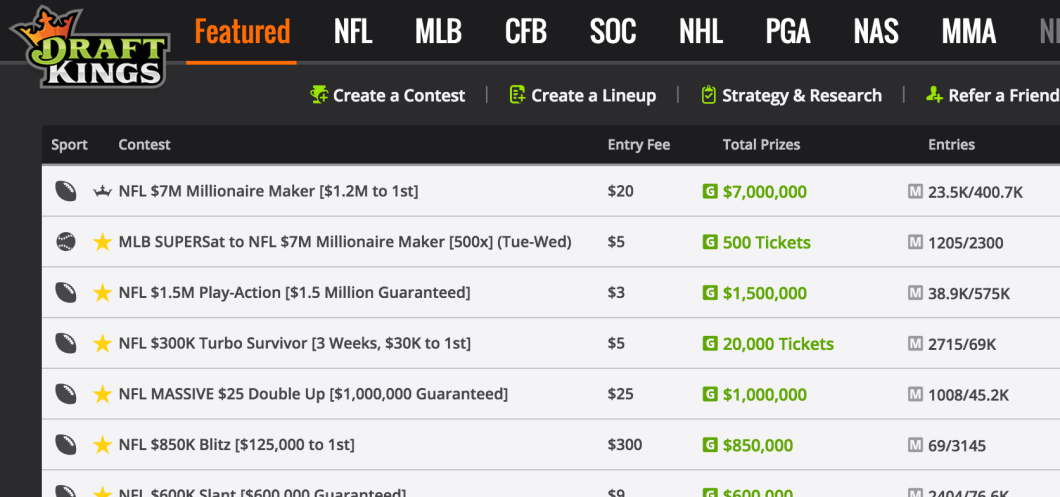DraftKings, FanDuel Defend Themselves Against “Insider Trading” Allegations

Some DraftKings users believe an employee of the site may have used inside information to win $350,000 at competing site FanDuel. Both companies deny the allegation.
Before the start of Week 3 in the NFL, a mid-level content manager at DraftKings released data about ownership levels of players in the site’s Millionaire Maker contest. This information, which shows how many people in the contest have put a certain NFL player on their fantasy team, could be incredibly important for someone looking for an edge over the thousands of other players involved in the contest, and it’s usually kept quiet until after the NFL games have started and fantasy lineups have been locked in.
If that were the end of it, people would probably just chalk it up to a mistake and move on. But when folks learned that this same DraftKings employee made $350,000 that week over at the NFL Sunday Million competition on FanDuel, allegations began to surface that he must have used this data to cash in on the competing site.
“It is absolutely akin to insider trading,” one sports and gambling lawyer tells the NY Times. “It gives that person a distinct edge in a contest.”
DraftKings has denied that the employee used the information to place his bets on FanDuel.
People also wanted to know why a DraftKings employee could be allowed to gamble on FanDuel or vice versa. The two companies did not have a policy preventing this sort of behavior until yesterday, when they both announced an end to the practice.
“One really has to ask questions over at DraftKings what regulations they have in place and why an employee has access to so much information,” a sports business scholar at Baruch College, City University of New York, explains to the AP. “One thing I find grossly troubling about DraftKings is they spend so much time and money advertising and a lot less time in internal controls and operating in a risk averse manner.”
In a joint statement, the two sites claim that they put integrity first.
“Both companies have strong policies in place to ensure that employees do not misuse any information at their disposal and strictly limit access to company data to only those employees who require it to do their jobs,” reads the statement. “Employees with access to this data are rigorously monitored by internal fraud control teams, and we have no evidence that anyone has misused it.”
In a burgeoning, unregulated industry that needs to win over customers, this scandal — even if the facts are what DraftKings claims them to be — may have done damage by souring users on the sites and drawing the eyes of critical legislators looking to clamp down on what some argue is not very different than going to the sports book at a casino.
“I’m all for daily fantasy betting,” the head of U.S. operations for a sports gambling chain tells the AP. “I think it should be legal, I think it should be regulated, and I think it should be taxed. But nobody is in favor of unregulated internet gambling and that is exactly what daily fantasy sports is.”
One gaming industry analyst explains to the Times that this attention “Certainly does not look good from an optics standpoint, and it strengthens the case for additional oversight and regulation.”
Though both DraftKings and FanDuel have been around for a few years, the two companies each recently received large investments and made media partnerships with pro sports leagues and media networks that have raised their profiles and advertising budgets.
According to the most recent report from iSpot.TV, four weeks into the NFL season FanDuel is still the third biggest spender on TV advertising, accounting for more than $14 million in commercials over the past seven days. That’s more than Ford, AT&T, Apple, or Chevy.
Want more consumer news? Visit our parent organization, Consumer Reports, for the latest on scams, recalls, and other consumer issues.

